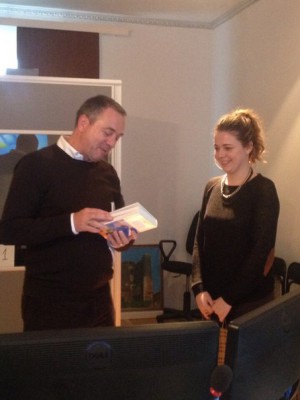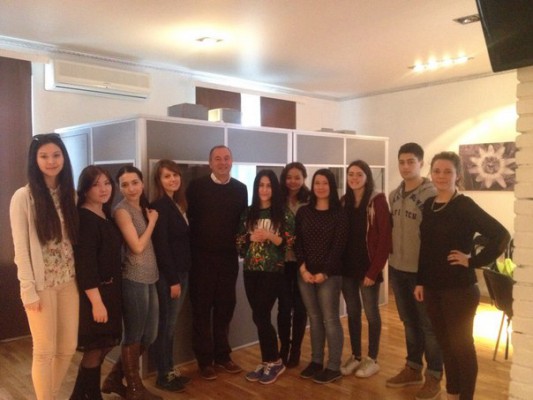Classes with the Head of the Italian Unit of the Directorate – General for Interpretation (SCIC) of the European Commission Paolo Torrigiani
 From March, 21 to March, 25 MA students of the Caspian Higher School of Interpreting and Translation have been trained by Paolo Torrigiani, the Head of the Italian Unit of the Directorate General for Interpretation of the European Commission.
From March, 21 to March, 25 MA students of the Caspian Higher School of Interpreting and Translation have been trained by Paolo Torrigiani, the Head of the Italian Unit of the Directorate General for Interpretation of the European Commission.
During the classes, the MA students improved their skills in consecutive and simultaneous interpretation, speech writing, note- taking technique and had a number of practical exercises aiming to form interpreter’s self – training skills. Paolo Torrigiani noted that self- training is a key stage in becoming an interpreter as a high – caliber professional. During one of these classes, the MA students divided into small groups to demonstrate how they usually hold their self-training sessions. Two groups prepared a “traditional” variant of a group session for consecutive and simultaneous interpretation practice and with the follow – up feedback on the main mistakes. Two other groups got some non-traditional tasks: one group was to hold a session on memory training that included a series of exercises on different methods of memorizing, and the other one presented some exercises on well-bred speech- making in their mother tongue and developing speech skills. As a result, the MA students mastered new practical activities that can be used during the group sessions, and realized that self-training is not limited to the training of consecutive and simultaneous interpretation but also should cover other skills and competences.
Some classes were held in the form of the first and the second year MA students joint work, which is very important to gain new experience, to develop communication, team working and declamatory skills. Due to this joint work, the students had an opportunity to practice different language combinations using relay- interpreting. No doubt, this kind of simultaneous interpretation is difficult, but for the MA students it is a great opportunity to prepare for real working conditions, because interpreters often have to work in this format.
Summing up the results of the classes, Paolo Torrigiani noted with appreciation solid background of the MA students of the Caspian Higher School of Interpreting and Translation and thanked them for their fruitful work. During the classes, Paolo gave students a number of valuable recommendations, spoke on methods of improving interpreting skills, and shared personal experience, that he has been gaining for twenty years of work in this area.
Thus, Paolo Torrigiani’s visit was a unique opportunity for the MA students of the Caspian Higher School of Interpreting and Translation not only to get valuable practical experience, but also to receive a necessary stimulus to continue their work on the development of professional interpreting skills.






